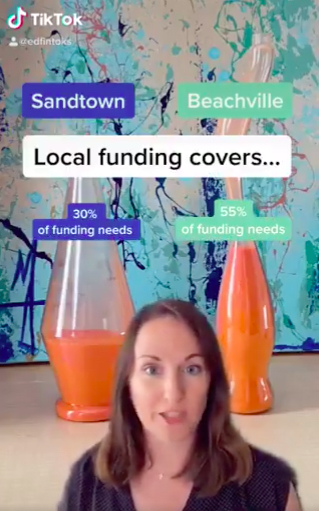TikTok may seem like it’s all about influencer houses and sipping cranberry juice. But the video-based social networking service has plenty of room for creativity for all types of users. With short videos that never exceed a minute and tools to add music and edit precisely, the format is proving to be the canvas for lots of different directions.
Judging by what Baltimore is producing this fall, one of those is taking public policy concepts, and creating fun explainers.
In September, Allovue CEO Jess Gartner launched a series of #EdFinToks to delve into education finance topics that are at the heart of the issues her Remington-based tech company is addressing.
https://twitter.com/jessgartner/status/1315994206469599233
Weeks later, Fourth District City Councilman Bill Henry, who chairs the equity and structure committee, started posting short videos on the ballot measures that voters are being asked to vote on alongside candidates during the ongoing general election, which will address the city’s Strong Mayor system and audits.
Both found TikTok to be an intriguing platform for explainers.
“Education finance topics can be really confusing and are often presented for an expert audience,” Gartner said. “My goal is to present the information in bite-sized chunks that are accessible to anyone and make learning about education finance fun, easy to understand, and memorable.”
While TikTok has gained a culture in its own right, Gartner said it was the format that was particularly appealing.
“The 60-second format is a good creative constraint and the editing tools and sound library on TikTok make it pretty easy to create the videos,” she said. She makes the videos on TikTok, but then finds engagement sharing them out on other social networks like Twitter and LinkedIn.
While each acts on their own, the videos can function as a series, as well. Gartner said she is looking to “scaffold the info over time,” allowing viewers to build baseline knowledge that will help to gradually get more specific.
“I wanted to start with very basic high-level topics like the major sources of education funding and slowly work towards more specific topics,” Gartner said. “I started with an overview of total funding from local, state, and federal sources, and then the next videos dug deeper in the specifics of each of those funding sources.”
https://twitter.com/AllovueBalance/status/1318549610110046212
For Henry, TikTok is an extension of his role as chairman of the City Council’s equity and structure committee, which has heard and approved the charter amendments that are going before voters. Question E would bring a review of the city’s charter, while Question F would give the City Council the ability to move funds to different departments.
“I hope people, especially young people, start thinking about how we can create the government we want by reforming the charter,” said Henry, who is also appearing on the ballot as the Democratic nominee for city comptroller in this week’s general election.
These questions are important on a structural level, but can go unnoticed amid the more personality-driven contests between candidates, so Henry sees another part of his job as educating the public. With TikTok, Henry saw a way to reach younger voters.
“TikTok is most popular for the demographic the government has the hardest time reaching — teens and young adults under the age of 25,” he said. “This group is also the voters that will be coming out in waves this November election.”
With the short video format, it’s necessary to think about what you want viewers to take away. For the ballot measure explainers, Henry works with his staff to ID topics that he has a passion for, and 10 key words they want viewers to walk away understanding. On EdFinToks, Gartner typically scripts out about 100 to 120 words that are presented in four to six chunks of 10 to 15 seconds each.
“It definitely helps to use captions with voice-over audio so that people can absorb the information in multiple ways,” she said.
Another early learning illustrates why TikTok stars are a thing, she said: “I’ve also learned that the episodes with video footage of the narrator tend to get higher engagement.” Putting yourself in front of the camera can be nervewracking and stressful, but it helps viewers connect.
For proof, take Henry’s answer to our question about what tips he’d offer folks looking to take up TikTok.
“Speak slow, use lots of on-screen text, and follow Jess Gartner,” he said. “She’s the queen of Baltimore informational TikToks.”







